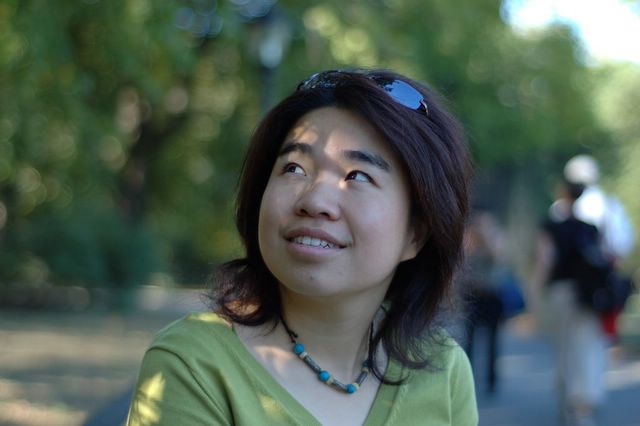
Yesterday night or early this morning, after four hours of non-stopping pool-training concentration camp, I sat comfortable on my bed and watched the new BBC adaptation of Jane Eyre. It was the last episode of the 4-part new production and just released in US. Ruth Wilson and Toby Stephens star in Sandy Welch's passionate new version of Charlotte Brontë's much-adored classic. According to PBS’s introduction, “Newcomer Ruth Wilson stars in the title role as the spirited but plain young woman who escapes a cruel charity home to find improbable true love. Toby Stephens is Edward Rochester, the enigmatic master of Thornfield Hall, who hires Jane as a governess for his young ward Adele. Or is it his daughter? All that is certain is that he is a man with a passionate past.”
Charlotte Brontë's novel Jane Eyre (1847) has been the subject of numerous television and film adaptations. In my mind, I still keep the darling image of the 1944 Hollywood version of the story. This 1944 classic adaptation was made by 20th Century Fox. It was directed by Robert Stevenson and produced by William Goetz, Kenneth Macgowan and Orson Welles (uncredited). The screenplay was by John Houseman, Aldous Huxley, Henry Koster and Robert Stevenson from the novel by Charlotte Brontë. The music score was by Bernard Herrmann and the cinematography by George Barnes. The film stars Orson Welles, Joan Fontaine, Margaret O'Brien, Peggy Ann Garner, Sara Allgood, Henry Daniell, Agnes Moorehead, John Sutton, with Betta St. John and Elizabeth Taylor making early, uncredited appearances)

What is surprising of this new production for a classics lover like me is the obviously depicted sexual relationship between Jane and Rochester. In many scenes, Rochester openly and passionately kissed Jane and they even kissed in bed. I doubt a Victorian gentleman will behave that way, but those “dirty tricks” certainly make a lot of sense to modern TV viewers. I feel a little bit uncomfortable with that, cause I always think Rochester was not attracted by Jane’s sexual appealing, but her beautiful mind. Nevertheless, I can not reject now that sex and love are never clearly separated in man’s mind. The sex-free and spiritual only relationship between the couple was my first impression of the novel when I read it as teenager. Like all the girls dreaming of romantics, I too fell in love with Jane and Rochester with their ill fated love. I even brought an English version by Penguin Publisher to adore this beloved story. As all the young girls, I dream of myself as the witty but plain Jane and encounter the passion of my live in a foggy country road.
小时候我喜欢简爱的性格和作派,觉得一个独立自由的女性非如此表现不可。最后结局的大逆转, 让简爱荣归故里,成为与罗切斯特平等的人,实在是大快人心。那个时候我觉得简爱出走的那一段十分多余,除了让罗切斯特的前妻体面退场和让简爱发了横财之外,没有什么用处,本来可以一笔带过。昨天又看了一遍结尾(尤其是简爱和圣约翰关系的那一段),才发现这看似多余的一笔,画龙点睛,是本书的精华所在。如果说罗切斯特第一个发现了简爱的价值,意识到她性格的魅力,他只是把她当作一个恋爱的对象来对待,想象着凭借婚姻是简爱变成他的私有财产。如果他们幸福地结了婚,简爱的存在对于外界来说等于零。但是简爱的出走,使她的价值得到了社会的承认(成为乡村学校的女教师),她不再是罗切斯特或者任何人的一部分,她成为了独立的社会存在。她的出走使得这一切成为了可能。她的出走使得她获得了选择的机会(她可以选择回到罗切斯特身边,也可以选择成为传教士的夫人,或者终身不嫁依靠自己的财产或者劳动生活)。这一切在一个具有相对封闭性的婚姻关系中是不可能实现的。而且,更为重要的是简爱在离开了罗切斯特以后,对于信仰和爱有了新的认识。与罗切斯特的决裂,使她将婚姻、爱和尊严分开;与圣约翰的决裂,使得她将信仰、爱和婚姻分开。她的怀疑精神得到了最大限度的实现。在这个意义上,她成为了罗切斯特平等的伴侣。这个地位不是凭借婚姻获得的,是通过她自我的实现而实现的,不是被给予的,而是赢得的。
在简爱出走以前,整个故事都在讲述一个孤女如何凭借自己的努力赢得了一个成熟男性的爱,即主流社会的认可。即使罗切斯特貌似生活在主流社会的边缘,但是他的财产和男性地位使得他仍然是主流中的主流—白人男性。至此,简爱的努力是按照传统女性发展的套路来进行的,她的成功也是被社会所定义的,即获得一个地位和身份都比她高贵的人的承认,或的主流社会的承认。简爱的出走使得她不必再依赖于罗切斯特的承认来实现个人的价值,她开始自己定义自己的生活。她不再需要所谓主流社会的认可,因为她已经出离了它的界限。即使没有因为巧合而获得大笔的遗产,简爱仍然可以成为自足的存在。在这个意义上,她必须也只有出走,才能完成在罗切斯特身边开始的成长过程。从这个意义上,故事的结尾实际上是勃朗特对主流社会的致敬,对于传统妇女美德的致敬。“不离不弃”在这里成为了这个经典叙事的结尾,但是我觉得纯属狗尾续貂。其实,完全可以把这个故事在简爱拒绝圣约翰的求婚后打住,或者让简爱发现罗切斯特的确在大火灾中死了。这样,这个故事就变成了传统意义上的悲剧(即个人的努力无法改变命运),应该更加让人觉得缠绵悱恻,余韵犹存。

















